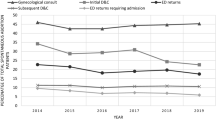Abstract
Purpose
This study evaluated the differences in treatment outcomes between misoprostol and surgical evacuation for the management of incomplete abortion.
Methods
This retrospective cohort study compared patients with a clinical diagnosis of incomplete abortion who underwent surgical or pharmaceutical (misoprostol) intervention, 2014–2017. Demographics, sonographic results, treatment follow-up, and post-intervention data on retained products of conception were retrieved. Women with incomplete abortion who underwent surgical versus pharmaceutical intervention were compared.
Results
Among 589 spontaneous abortions, 198 were included in the study, of which 123 (62.1%) underwent surgical evacuation and 75 (37.9%) pharmaceutical intervention with misoprostol. Baseline characteristics were similar between groups. During 130.8 ± 91.7 days of follow-up, no patient who underwent surgical evacuation had retained products of conception or needed surgical hysteroscopy. Four cases (5.3%) in the misoprostol group had retained products of conception and needed hysteroscopy (p = 0.02). Patients who underwent surgical evacuation had higher hemoglobin levels during follow-up (12.1 mg/dL vs. 11.7 mg/dL, p = 0.05). There were no differences in post-treatment pregnancy rates between groups.
Conclusion
Long-term follow-up after incomplete abortion showed that hemodynamically stable patients treated with misoprostol achieved the desired results in 95% of cases without significant differences in pregnancy intervals compared to surgical management. Further prospective studies with larger sample sizes are required to confirm the outcomes described in this study.
Similar content being viewed by others
Data availability
Data available upon request and based on research committee approval.
References
Kim C, Barnard S, Neilson JP et al (2017) Medical treatments for incomplete miscarriage. Cochrane Database Syst Rev. https://doi.org/10.1002/14651858.CD007223.pub4
Shorter JM, Atrio JM, Schreiber CA (2019) Management of early pregnancy loss, with a focus on patient centered care. Semin Perinatol 43:84–94. https://doi.org/10.1053/j.semperi.2018.12.005
(2018) ACOGPractice Bulletin No. 200: Early Pregnancy Loss. Obstetrics & Gynecology 132:e197–e207. https://doi.org/10.1097/AOG.0000000000002899
(2015) Practice Bulletin No. 150. Obstetrics & Gynecology 125:1258–1267. https://doi.org/10.1097/01.AOG.0000465191.27155.25
Wang X, Chen C, Wang L et al (2003) Conception, early pregnancy loss, and time to clinical pregnancy: a population-based prospective study. Fertil Steril 79:577–584. https://doi.org/10.1016/S0015-0282(02)04694-0
Bagratee JS (2004) A randomized controlled trial comparing medical and expectant management of first trimester miscarriage. Hum Reprod 19:266–271. https://doi.org/10.1093/humrep/deh049
Lemmers M, Verschoor MA, Kim BV et al (2019) Medical treatment for early fetal death (less than 24 weeks). Cochrane Database Syst Rev. https://doi.org/10.1002/14651858.CD002253.pub4
Ankum WM (2001) Regular review: management of spontaneous miscarriage in the first trimester: an example of putting informed shared decision making into practice. BMJ 322:1343–1346. https://doi.org/10.1136/bmj.322.7298.1343
Chen BA, Creinin MD (2007) Contemporary management of early pregnancy failure. Clin Obstet Gynecol 50:67–88. https://doi.org/10.1097/GRF.0b013e31802f1233
Pauleta JR, Clode N, Graça LM (2009) Expectant management of incomplete abortion in the first trimester. Int J Gynecol Obstet 106:35–38. https://doi.org/10.1016/j.ijgo.2009.02.018
Zhang J, Gilles JM, Barnhart K et al (2005) A comparison of medical management with misoprostol and surgical management for early pregnancy failure. N Engl J Med 353:761–769. https://doi.org/10.1056/NEJMoa044064
Cooper DB, Menefee GW (2022) Dilation and curettage
Blum J, Winikoff B, Gemzell-Danielsson K et al (2007) Treatment of incomplete abortion and miscarriage with misoprostol. Int J Gynecol Obstetr 99:2
Rausch M, Lorch S, Chung K et al (2012) A cost-effectiveness analysis of surgical versus medical management of early pregnancy loss. Fertil Steril 97:355-360.e1. https://doi.org/10.1016/j.fertnstert.2011.11.044
Mizrachi Y, Ben-Ezry E, Kleiner I et al (2020) Reproductive outcome after early pregnancy loss treated with misoprostol versus surgical aspiration. Reprod Biomed 41:707–713. https://doi.org/10.1016/j.rbmo.2020.07.004
Tzur Y, Samueloff O, Raz Y et al (2021) Conception rates after medical versus surgical evacuation of early miscarriage. Fertil Steril 115:118–124. https://doi.org/10.1016/j.fertnstert.2020.07.016
Davis AR, Hendlish SK, Westhoff C et al (2007) Bleeding patterns after misoprostol vs surgical treatment of early pregnancy failure: results from a randomized trial. Am J Obstet Gynecol 196:31.e1-31.e7. https://doi.org/10.1016/j.ajog.2006.07.053
Funding
This study was not funded.
Author information
Authors and Affiliations
Contributions
MS: project development, data analysis, manuscript editing. YY: data analysis, manuscript writing and editing. RS: manuscript writing. YD: data analysis, manuscript editing. ZK: data analysis, manuscript editing. RS: conceptualized the project, data analysis, manuscript editing.
Corresponding author
Ethics declarations
Conflict of interest
Author Merav Sharvit declares that she has no conflict of interest. Author Yael Yagur declares that she has no conflict of interest. Author Rebecca Shams declares that she has no conflict of interest. Author Yair Daykan declares that he has no conflict of interest. Author Zvi Klein declares that he has no conflict of interest. Author Ron Schonman declares that he has no conflict of interest.
Ethics approval
All procedures performed in studies involving human participants were in accordance with the ethical standards of the institutional and/or national research committee and with the 1964 Helsinki declaration and its later amendments or comparable ethical standards.
Informed consent
According to the retrospective nature of the study conducted, informed consent was not required from the participants.
Additional information
Publisher's Note
Springer Nature remains neutral with regard to jurisdictional claims in published maps and institutional affiliations.
Supplementary Information
Below is the link to the electronic supplementary material.
Rights and permissions
Springer Nature or its licensor (e.g. a society or other partner) holds exclusive rights to this article under a publishing agreement with the author(s) or other rightsholder(s); author self-archiving of the accepted manuscript version of this article is solely governed by the terms of such publishing agreement and applicable law.
About this article
Cite this article
Sharvit, M., Yagur, Y., Shams, R. et al. Outcomes of incomplete abortion related to treatment modality. Arch Gynecol Obstet 308, 1543–1548 (2023). https://doi.org/10.1007/s00404-023-07182-7
Received:
Accepted:
Published:
Issue Date:
DOI: https://doi.org/10.1007/s00404-023-07182-7




